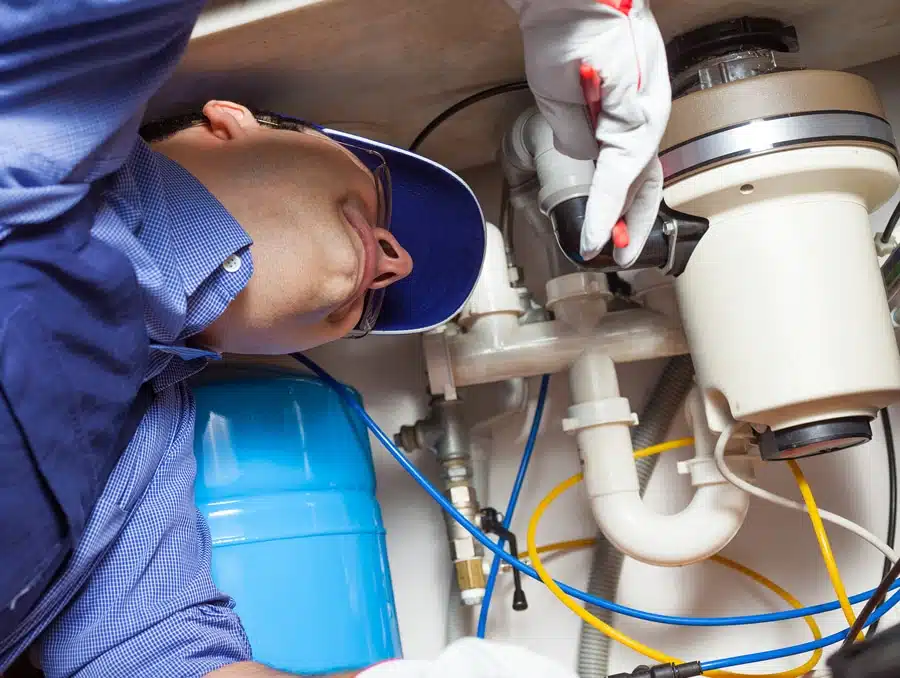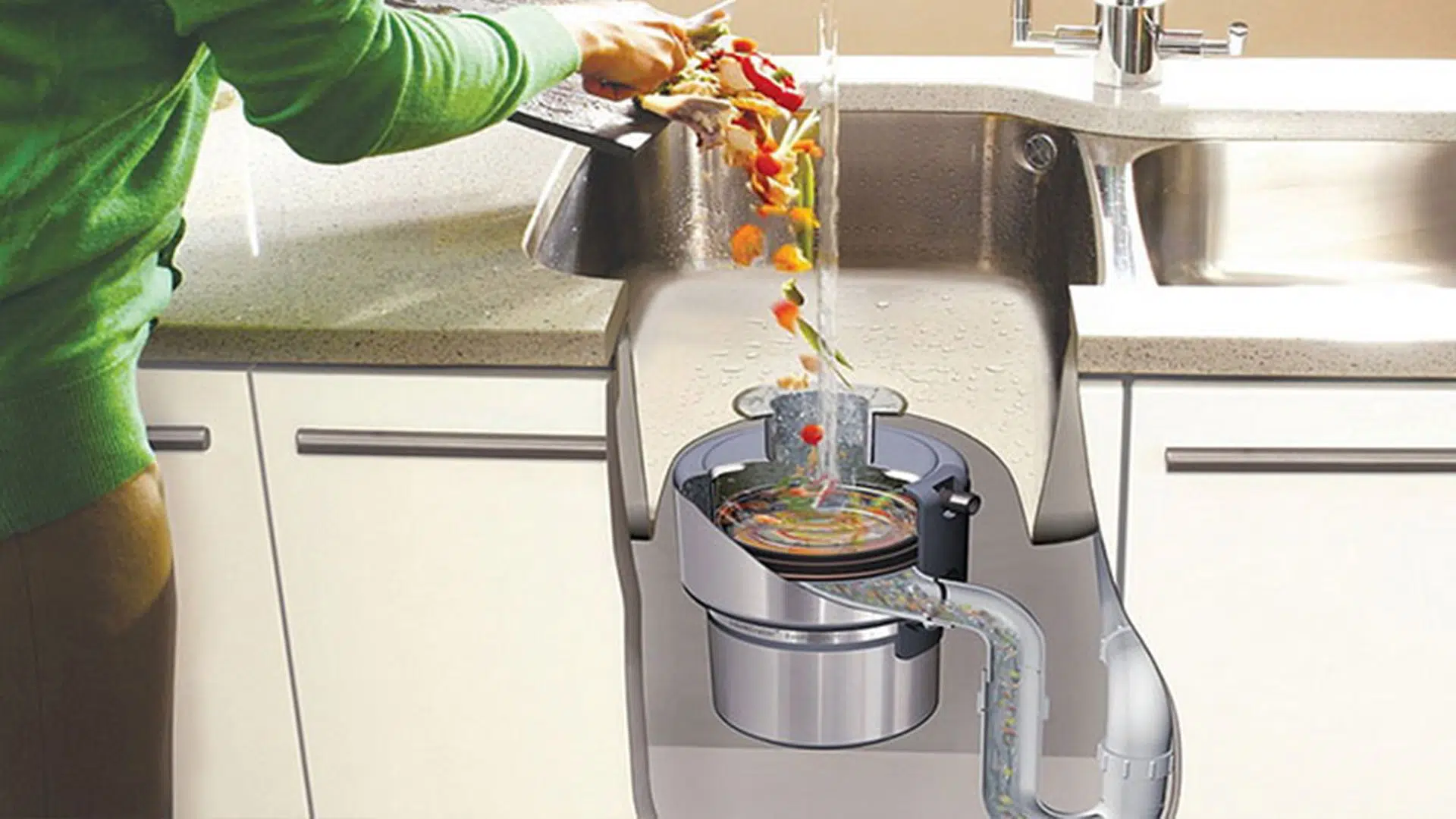We know from childhood that we cannot put food in the sink because it will create a collapse in pipes and the whole sewage system of the house. That is why a lot of citizens prefer to install a garbage disposal in their sinks and do not think about unpleasant smells or defects in the plumbing system. Once you try to use this system in your home, you will feel the convenience of garbage disposal.
Garbage disposal is a device that you can set under the sink drain and forget about clogs and water stagnation. It works in such a way that you put some wasted food inside the sink, and garbage disposal crushes it into tiny pieces, making them appropriate for the draining system. After that, this food will not disturb you as its size is small enough for the sewer system.
Having garbage disposal, you can be confident that there is no risk for your plumbing, common canalization, and ecology. Installation of garbage disposal is not allowed in some cities, but most residential areas permit them to use them. The only condition when it may cause some issues is its attachment to a private septic system because it cannot process food waste.
However, garbage disposal requires constant maintenance. Otherwise, it will be damaged and will stop working properly. If you do not pay attention to your garbage disposal performance, you may face the same problems you could face without this device. You will need to spend money on plumber services and equipment replacement that are expensive procedures.
Read this article to know more about the basic principles of garbage disposal maintenance. So, we will cover these topics in the review:
Once you decided to set garbage disposal at home, you should know these simple rules and do not neglect them:
Except for preparing actions, you need to make regular inspections of the garbage disposal. Here is the list of activities you should constantly do if you have a garbage disposal in your home:
The point is that everyone has the responsibility to care for the whole sewage system in the city and not only for their plumbing. Most pipes and plumbing systems, in general, cannot process food waste, and excess of food in them can lead to expensive repairings in the future. That is why there are limitations connected to the various substances that you can put at the disposal at home. Some people think that they can throw everyday garbage waste at their disposal, but it will cause clogs in pipes and other awful consequences.
Remember that usually, problems occur not in the disposal itself but the pipes. It means that you will spend even more time and money to repair the system than to control its working regularly. If fats and leftover food get stuck in the pipes, you will need to replace them. So, there will be a long-lasting renovation in your kitchen because of the minor defects that you did not control earlier.
You and other users of the garbage disposal should learn that the only waste you can put into the disposal is food. Any plastic, metal, paper elements can put at risk this mechanism and plumbing system in your house.
The list of forbidden to throw into garbage disposal items:
Besides, you may think that hot water will melt fats and remove their clogs, but it does not work like this. Hot and warm water will only make clogs stronger, and you will not be able to get rid of them by yourself. Use only cold water for cleaning your garbage disposal.
The rule of thumb is to throw everything you are not sure about into the trash can but not into the garbage disposal. Moreover, do not try to put your hands inside the disposal because it would cut your hand if you did not stop it. It is always better to use tongs for this purpose and turn it off before any movements.

In contrast to other mechanisms, garbage disposal does not require special cleaning agents for maintenance. We collected several ways for cleaning the garbage disposal in the list below. All of the materials and substances are cheap, and you can find them at home.
Do not forget to apply our recommendation about citrus fruits after cleaning the garbage disposal.
Except for blockages and damages in the pipes, there are some smaller problems that you can face while using the garbage disposal. For instance, it can just not work because of the turned-off electricity. In this case, you should check whether the garbage disposal is plugged into electricity or not.
Sometimes the solution is not so easy, and you need to follow another procedure to launch the garbage disposal. If turning on did not help, you should restart its work. There is a special button on the garbage disposals, and usually, it is located on the bottom. So, you should find this button of red or black color and push it. It can be inconvenient to use this button because your garbage disposal may be too large. We recommend you use a small mirror for better navigation under the garbage disposal. The problem with the button may occur if it jumps out of its place. Returning it will restart its work process.
Besides, there is an integrated automatic breaker in the garbage disposal, and the problem of strange work can be in it. You need to use it for restarting, and if it does not work, you should repair it. In the latter case, you will spend some money on the fixation of this device.
Finally, if you have tried all these ways of launching the garbage disposal but nothing helped you, you should call for a specialist and pay for its repair or replacement.
So, now we know in detail all the ways to save your garbage disposal from crushing. However, you cannot be confident in resolving any issue that is untypical and rare for these mechanisms. That is why sometimes you will need to call plumbers to fix some elements at your disposal.
The most popular reason for defects is the wrong installation. It will cause leakages, clogs, and other unpleasant consequences for your equipment.
So, you should seek help from a plumber when:
Do not hesitate to get a service from high-quality plumbers from Benjamin Franklin Bay Area. You should not struggle with mounting and maintenance by yourself because you can always receive help from our company. We will provide you with all information about the proper and safe usage of garbage disposal and an explanation of the possible problems you may face. Call us every time you have some defects in the work of your garbage disposal, be it an unpleasant smell, blockages, leakages, or other types of issues. We will send a plumber to you who will repair everything quickly and top-quality.
Protect your equipment in advance to save your time and money in the future.
I bring over 9 years of dedicated plumbing experience to the table. As a seasoned professional in the plumbing industry, I've tackled a wide range of projects, from residential repairs to large-scale commercial installations.

